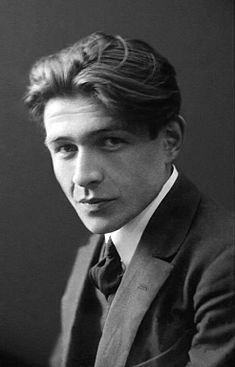Gaito Gazdanov facts for kids
Quick facts for kids
Gaito Gazdanov
|
|
|---|---|
 |
|
| Native name |
Гайто (Гео́ргий) Иванович Газданов
Гæздæнты Бæппийы фырт Гайто |
| Born | Gaito [Georgii] Ivanovich Gazdanov Gæzdænty Bæppijy fyrt Gajto 6 December [O.S. 23 November] 1903 Saint Petersburg, Russian Empire |
| Died | 6 December 1971 (aged 68) Munich, BRD |
| Occupation | short story writer, novelist, Radio Free Europe/Radio Liberty editor |
| Citizenship | Russian Empire (1899–1917) France (1920–1971) |
| Notable works | An Evening with Claire The Specter of Alexander Wolf Night Roads |
Gaito Gazdanov (born December 6, 1903 – died December 5, 1971) was a famous Russian writer. He lived most of his life in Paris, France. He was from a group of people called Ossetians, whose homeland is in the North Caucasus region.
Gazdanov's first stories were published in France in 1926. He wrote them in Russian, even though he lived in France. His books An Evening with Claire (1929) and The Spectre of Alexander Wolf (1948) are his most well-known works. Famous writers like Maxim Gorky admired his writing. During World War II, Gazdanov was part of the French Resistance, a group that fought against the occupation of France. Later, he worked as an editor for Radio Free Europe/Radio Liberty.
Contents
Gaito Gazdanov's Life Story
Gaito Gazdanov was born in 1903 in Saint Petersburg, Russia. He grew up in different parts of Russia, like Siberia and Ukraine. His father worked as a forester, taking care of forests.
Early Life and Moving to Paris
When he was young, Gazdanov took part in the Russian Civil War. He fought with the White Army. In 1920, he left Russia and moved to Paris, France.
In Paris, he worked in factories, including the Renault car factory. His early stories and books were often about his experiences in Russia. Later, he became a taxicab driver to earn a living.
Writing Career and Later Works
Gazdanov's first novel, An Evening with Claire (1929), was highly praised. Critics said he was one of the most talented new writers who had moved away from Russia.
After World War II, Gazdanov started writing a new type of story. These were sometimes called "metaphysical thrillers." He was very good at creating exciting plots and understanding how people think. Two of his popular novels, The Spectre of Alexander Wolf and The Return of the Buddha, were translated into English in the 1950s.
His writing showed a mix of sadness and a strong desire to enjoy life.
Radio Work and Legacy
In 1953, Gazdanov started working for Radio Liberty. He hosted a show about Russian literature using the name Georgi Cherkasov. He continued this work until he passed away from lung cancer in 1971 in Munich.
For many years, Gazdanov's books were not published in the Soviet Union. But after the 1990s, his works became popular again in Russia. Many collections of his stories and novels were published. His grave in Sainte-Geneviève-des-Bois Cemetery in France received a new tombstone. People also hold yearly "Gazdanov Readings" to discuss his books.
Selected Works
Novels
- An Evening with Claire, 1929
- The Flight, 1939
- Night Roads, 1939–40
- The Spectre of Alexander Wolf, 1947–48
- The Buddha's Return, 1949–50
Short Stories
- "The Beggar"
- "Black Swans" (1930)
- "Deliverance" (1936)
- "The Mistake" (1938)
- "Ivanov's Letters" (1963)
English Translations
- The Specter of Alexander Wolf, translated by Nicholas Wreden (1950)
- Buddha's Return, translated by Nicholas Wreden (1951)
- An Evening with Claire, translated by Jodi Daynard (1988)
- Night Roads: A Novel, translated by Justin Doherty (2009)
- The Spectre of Alexander Wolf, translated by Bryan Karetnyk (2013)
- The Buddha's Return, translated by Bryan Karetnyk (2014)
- The Flight, translated by Bryan Karetnyk (2016)
- The Beggar and Other Stories, translated and introduced by Bryan Karetnyk (2018)
Images for kids
See also
 In Spanish: Gaito Gazdánov para niños
In Spanish: Gaito Gazdánov para niños
 | William Lucy |
 | Charles Hayes |
 | Cleveland Robinson |


